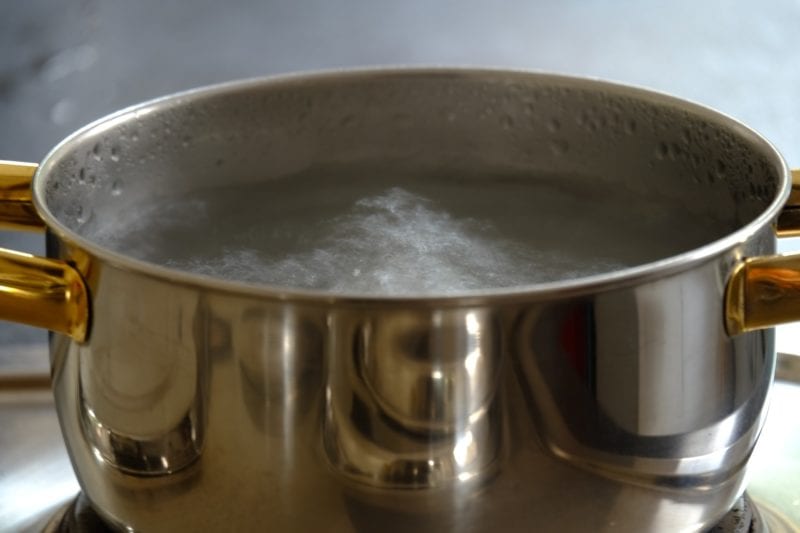Last updated on October 23rd, 2023 at 08:52 pm
Weeds not only detract from the impression on the sidewalk. They can be a real danger due to uncontrolled growth. The roots lift sidewalk slabs and make paths unstable. In this way, a tripping hazard is formed that poses a risk to many a visitor.
To ensure safety, you should tame the weeds on the sidewalk. There are various methods available for removal. But after removal, there is a high probability that the weeds will return.
So that this does not happen and you save yourself the extra work, now learn how to get rid of the weeds on the sidewalk sustainably. Then you can safely use your garden again and your lawn will not be pushed back by weeds.

Contents
Manual removal
If the weed infestation is only slight, the easiest way to remove the weeds is to pull them out manually. The important thing here is to try to reach the root if possible. Only by getting the root out of the ground will you prevent the weed from growing vigorously again.
The work will be easier if you use a joint scraper. The joint scraper is used between the individual sidewalk slabs and effectively gets to grips with the weeds. Equipped with a longer handle, this is easy on your back, so you hardly notice the effort, even if you work for a long time. As a result, you will get clean sidewalk slabs and the weeds will not appear anytime soon.
Salt against the weeds
To remove the weeds, you do not need to use chemical and strong-acting weed killers. It is easier to get rid of the weeds with home remedies, such as the salt. However, it should be said that the salt is not at all environmentally friendly. It penetrates into the soil and thus into the groundwater. There it leads to contamination and increases the salt content. Because of these massive effects, the application of salt to remove weeds or during snowfall is prohibited in most cases. This is regulated in the Plant Protection Act §6. There it is clearly described that the salt may not be applied on the terrace, sidewalks or driveways to control weeds.
So you should find out in advance if the salt solution against weeds is not a problem in your area. If this is the case, you can simply dissolve some salt in water. You then put the mixture into the joints and all the plants will die. However, this will affect all plants, as nothing will grow in the salty soil.
Vinegar against weeds
The salt is a very controversial application option and is not exactly compatible with the environment. A little more gentle is the use of vinegar. Nevertheless, vinegar, like salt, is not allowed for application on horticultural land under the Plant Protection Act. Whether you are allowed to use vinegar, you must clarify beforehand.
After that, the application of vinegar is similarly simple as the salt. Prepare a solution of vinegar and water. Squirt the mixture into the joints and with a little patience the weeds will go in. Now you need to remove the dead weeds. This is not an underestimated effort, but the weeds will be eliminated permanently.
Hot water

The previous home remedies are proving dangerous not only against the weeds, but also permanently affect the quality of the soil. Fortunately, the boiling water is more compatible for the environment.
Weeds are generally very resistant and undemanding. Therefore, for example, moss manages to spread in the lawn and grow in worse conditions. However, one weakness is temperature tolerance. Hot temperatures destroy the cell structure, so that the plant dies.
You can take advantage of this fact by dispensing hot water over the joints. Either put hot water on or just use the old pasta or potato water after cooking. Pour it over the weeds and the effect will be obvious after a few days. Now remove the plant debris and you can make the walkway safe.
Weed burner
Heat works wonders against the weeds. The plant is destroyed and is no longer a nuisance. If it is a large area that is infested with weeds, it is a good idea to use a weed burner or weed killer. Unlike the names suggest, these devices do not emit a large flame, but work with a very direct and targeted heat.
To operate, electric weed eaters must be plugged into an electrical outlet. This restricts movement somewhat, but with an extension cord you should be able to cover the entire walkway.
Now turn on the device and hold the end directly above the weeds. Such a strong heat is generated that the weeds will die and not grow back. The advantage of these garden tools is that they are easy to use and require little effort on your part compared to scraping them out.
Electric joint cleaners
Another device that could prove useful in the fight against weeds in the garden is the electric grout cleaner. This one has several brushes on the tip that are designed to get right into the joints. With a high speed, the joint cleaners proceed much faster than if you were to pull out the weeds yourself by hand. Equipped with an ergonomic handle and a longer handle, the work is not very sweaty. In turn, a power connection is necessary for operation.
The disadvantage of joint cleaners, however, is that the root of the weed is usually left untouched. The weeds are removed rather superficially and there is a risk that they will grow back after a short time. Therefore, you proceed more thoroughly with the described weed burners or if you pull out the plants independently, including the root.
After using this cleaner, you need to close the joints again. Because not only the weeds, but also a lot of soil is removed from the joints, so that a larger free space is created. Conveniently, you can borrow larger equipment, such as the joint cleaner in most hardware stores. Thus, you do not have to spend a lot of money in case you use the device only once.
Biological weed killers
There are a variety of weed killers available in stores. These, unlike salt or vinegar, are allowed and may be used in the garden. Pelargonic acid, for example, is used here. This causes a significant death of the weeds after only a few hours. Nevertheless, even the biological weed killers are not completely harmless. If you spend this in the lawn, for example, to remove moss, you should not walk on the lawn for a few days. For bees, the agent is not dangerous and your crops will not be affected by it. So instead of permanently damaging the soil with salt or vinegar, the application of a biological weed killer is more suitable.
Remove weeds from the sidewalk
If you notice weeds on the sidewalk, you should remove this plant as soon as possible. Otherwise, it will spread unhindered and will also find its way into your garden. There, it will displace the lawn and make life difficult for the useful plants.
With the methods presented here, you will fight the weed sustainably. After removal, it will not reappear, so the effort for you is manageable. Afterwards, make sure that the joints are properly filled and the sidewalk slabs are stable.


